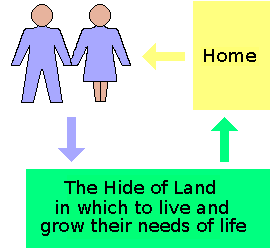
Ch09: Footnotes
The Event Horizon
The Dispossessed
Idyllic State
Purpose of Law
The Middleman
Noble Capitalist
The Noble Estate
Legal Theft
It is comforting to visualise an idyllic world in which a mix of agrarian settlers and trading nomads live together in peace. Unfortunately, such a society is inherently unstable: not because of any flaw in its structure, but because of the self seeking motive which regulates the human mind.
In their act of settling down, the ancient nomads commandeer from the environment as much land as they need to clear and plant to provide their needs of life. Thus emerges the family-based economic system known as the landshare.

The landshare is an economic model in which each nuclear family has the free and direct use of enough natural resources to transform its labour directly into its material life supporting needs. Its permanent site allows the family to build a far more comfortable, though no longer mobile, home.
The Earth's surface is not homogeneous. It is not a continuous flat plain with regularly spaced water sources. It is split by physical features into regions — and regions within regions — in a kind of irregular hierarchy. A region, whatever its size, has a boundary and a focus.
The focus of a family's landshare is usually a source of water — a spring, stream, pond or well. Its boundary is usually a copse of protective trees, a bank or a river.
But families try to stay close to the rest of the natural community to which they belong. So their 100 or so landshares therefore normally concatenate into a community hinterland. In ancient England this larger area was known as a Hundred. I live near what was the ancient Clavering Hundred.
The natural focus of the Clavering Hundred is the spring and first 12km or so of the River Stort as it flows south. Its land is the flood plain and valley stretching for 4km either side of the river. It is bounded by hills. Today these do not present much of a boundary. But they do form an effective boundary insofar that anybody living on them would be drawn equally towards the natural focus of one of the neighbouring Hundreds. Compared with its neighbouring Hundreds the Clavering Hundred is small. Nevertheless it was big enough to allow almost 1km² of land per family. The historical details of the Clavering Hundred — and their accuracy or lack thereof — are not critical here. They are merely an aid to bringing in to focus the picture of a natural human community in its natural setting.
A hundred landshares nestling together within a hinterland provides natural domains which are conducive to constructive social interaction. Little places where people can stop and talk as they pass by. A central focal area where the whole community can meet for specific events. Homes close enough to form a natural community, yet sufficiently far apart to provide each family with adequate privacy and direct access to the natural means through which they turn their labours into their needs of life.
Thus the natural lie of the land of a landshare-based community makes it so each member of the community knows every other member personally. His character, personality, integrity. His endeavours, his achievements, his difficulties, his needs. Everybody belongs. Everybody has a stake in the whole community. They are friends as well as neighbours. The natural community thus provides all the human needs — both physical and sociological.
Within a natural community, each family has use of its own share of the Earth's resources to produce its needs. But inevitably, not every family is able to provide for itself adequately all the time. Some may suffer illness from time to time. Some may make bad judgements which may hurt their own economies, but from which the community as a whole can benefit by learning from their mistakes. In all such instances the community has the internal resources available to buoy up those of its members who, through such circumstances become needy.
However, there are circumstances in which the entire community may find itself in need. The planet's climate is not constant. Nomads have to follow the path of fertility. The place one may choose to settle may be fertile and get rain in due season now. But this can change over time in unpredictable ways. A community may thus be subjected to erratically spaced periods of feast and famine according to the whims of the weather.
All human economic endeavour is powered and sustained by the Earth's biosphere. The Earth's biosphere is a dynamical system. So it is no surprise that human economies reflect the behaviour of the engine which drives them. It is natural for the seasonal rhythms of seed-time and harvest to be modulated with unpredictable ups and downs. Transient disparities in what a family is able to produce are therefore inevitable. Settled communities can even out these ups and downs to some extent by saving in times of plenty to provide for times of famine. However, what one isolated community is able to put by in a time of plenty may not be enough to sustain it through a prolonged time of famine.
Nevertheless, however erratic the global weather may appear, it is bound by its behavioural attractor always to provide rain in due season at least somewhere on the planet. Consequently, there is always bound to be a community somewhere which is having a time of plenty.
The human ability to communicate over long distance through symbolic language enables all to know who is in need and who had excess at any particular time. Thus, those with plenty are able to provide for those in need by exchanging goods with them through a free market.

These complex dynamical ups and downs of the weather do however serve a very good purpose. They give some people the opportunity to help, and others the humility to be helped. They provide a catalyst for the development of relationships. As such, they are the driving force which welds otherwise isolated family units into an equitable society in which everybody possesses the natural means adequately to provide for themselves as well as for those who find themselves in need.
This in turn gives people the means and the motivation to develop arts, technologies, literature and culture. Furthermore, through language, all the human beings on Earth become connected directly or indirectly. The actions and ideas of each — no matter how insignificant — are thus able to propagate throughout the whole of the society and so benefit everybody. This is a world in which there is more than enough for everyone. A world in which each can occupy and use enough of the Earth to meet his needs without depriving anyone else by so doing. A world in which each settles his own landshare or grazes freely along his own nomadic trail.
This, many would suppose, would be the ideal society. Perhaps so, but unfortunately it is inherently unstable. If it ever existed at all, its existence was bound to be short-lived. This is not due to any systematic flaw in its socio-economic structure, but to a flaw in the natural protocol built into the mind of man by which each deals with his neighbour.